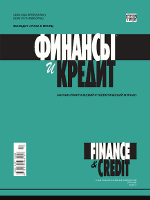Abstracting and IndexingРИНЦReferativny Zhurnal VINITI RAS Worldcat LCCN Permalink Google Scholar Online availableEastvieweLIBRARY.RU Biblioclub |
On the lack of options of economic and political changes
Available online: 3 November 2014 Subject Heading: MONETARY POLICY JEL Classification: Pages: 27-33
The article considers the negative results of the Russian modern economic development. The author refers to de facto recession observed in manufacturing industry and agrarian sector, as well to deterioration of a financial condition of the enterprises in many areas of the Russian economy, and the budgetary crisis in considerable number of regions, which strengthens inflation, decrease investment activities, and causes the noticeable signs of all-economic recession. The paper emphasizes the need of diagnostics of the key problems connected with the observed "slip-down", and underlines that only at that time scientific justification of the positive scenario of future development of the Russian economy becomes possible, when the conditions of changes in economic policy and, in particular, in monetary policy will become possible. The article claims that many experts see full exhaustion of the working model of economic development as the main reason of the observed stagnation. The model contemplated interconnected, inertial export growth of raw material resources, consumer goods import and the foreign loans. Investment of budgetary funds and the State-controlled capital, innovation activities support and strengthening of the Eurasian economic integration constitute the main economic and political stimulants of economic activity, which lies out of scope of the raw materials. The author comes to a conclusion that in order to overcome the existing innovation and structural stagnation, the national economy should employ comprehensive, fast technological modernization as single option, and at the same time, it serves in the capacity of the necessary institutional changes. This process is quite reasonably called as the new industrialization (neo-industrialization). That process unambiguously presupposes the large-scale shifts in the status of industrial markets and production services markets, and also requires deep-rooted structural reforms. The difficult macroeconomic and financial situation expediently requires concentration of efforts along the most significant directions of neo-industrial transformations. The author points out that international experience leads us to a conclusion that in order to succeed new industrialization necessitates prompt setting up of the full-fledged regional hi-tech clusters, which comprise the interconnected networks of innovative firms, industrial enterprises and services. Keywords: ruble devaluation, economic policy, new industrialization, development bank References:
|
ISSN 2311-8709 (Online)
|
|








